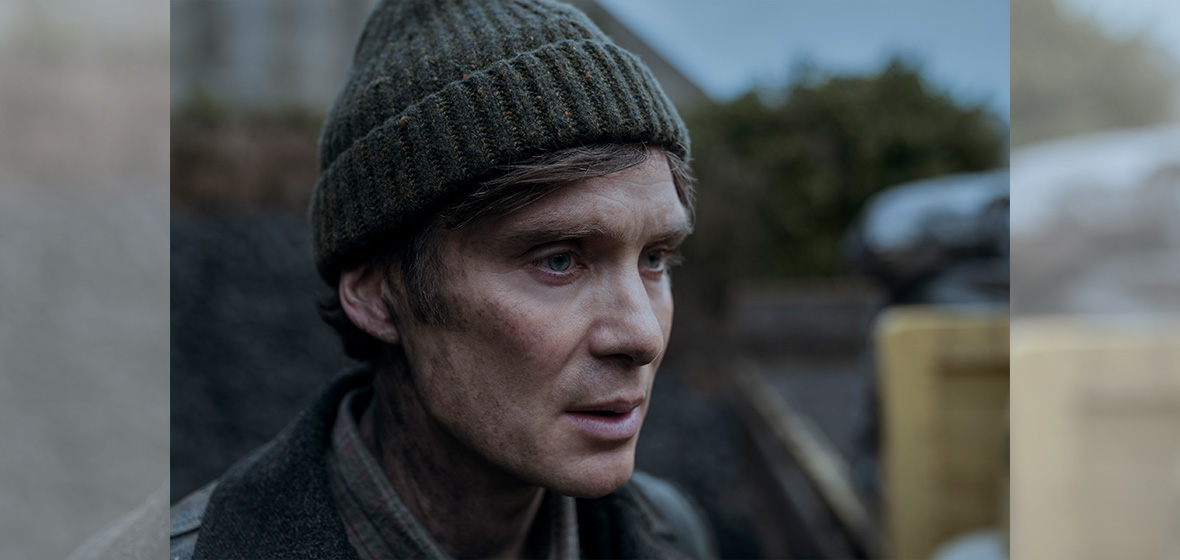Tim Mielants’ adaptation of Claire Keegan’s Small Things Like These is a film of quiet details. Bill Furlong (Cillian Murphy), father and dedicated business owner in 1980s Ireland, deals with an internal conundrum when he accidentally meets one of the “fallen women” from a local Magdalene laundry. It’s Christmas in Ireland, the season unearths in Bill’s memories from his childhood growing up fatherless with the support of Mrs Wilson (Michelle Fairley), a wealthy benefactor who offered refuge to Furlong’s mother when she became pregnant. When he finds a woman hiding in the coal storage room, Bill thinks about his life. Would he be here today – an upstanding citizen of society with a lovely family and five daughters? Does he have a responsibility to help, even if it’s against the interests of a religious institution? Bill’s wife, Eileen (Eileen Walsh), wants to focus on his work and family; nothing good comes from meddling in other people’s business. “If you want to get on in this life, there are things you have to ignore”, she tells him. Easier said than done.
Small Things Like These strips its story to the bare essentials of the plot. Like the book, it focuses on the little details to elevate its message. It can be Bill quietly washing his hands after a hard day delivering coal, looking at his daughters arguing about Christmas presents as he, we think, thinks, what if they were in one of those Magdalene laundries? Keegan’s book complements those moments by detailing precisely what he’s thinking about it. The film cuts that, and lets us guess.
It helps Murphy is such a great actor; he can convey conflicting emotions with one flick of his eyebrow. But it’s also helped Mielant to create a quiet and effective mise-en-scene. It’s in Bill’s jacket’s shoulder patches, perfect for carrying large bags of coal. Or how he looks at the boys talking to his older daughter – because he knows what will happen to her if something happens. It’s a little boy collecting wood without a bag off the side of the road, so Bill gives him some loose change. And how his wife scoffs at the charitable act because the boy’s father spends his time in the pub: one day, you’re learning about how the kingdom of heaven is for the blessed poor, the next day your aunt refuses to give change to a homeless man because “it’ll make them lazy”.
Mielants, like Keegan, isn’t criticising this side of Irish society, but it’s impossible to hide the conflicting thoughts when you’re putting so much detail. Eileen, for example, is not a villain, but she’s not sympathetic as well – especially when compared to Bill’s altruism. But she’s a product of her place – focused on the struggle facing her family alone and with little compassion for her fellow neighbour. It’s easier if you let the “small things” pass.
As quiet and thoughtful as the film is, it takes a striking turn with the introduction of Sister Mary (Emily Watson). She comes into play when it’s evident to everyone that Bill may pose a problem and may actually try to help one of the girls. With stiff authoritarian benevolence, Sister Mary offers tea and cake in front of the fireplace during a snowy night. Against, it’s the details that make the scene. The little light that only shines on one side of Bill. Sister Mary’s steady demeanour is as chilling to Bill as it is to the audience. Her movements were swift and her tone direct. It’s the closest thing the film has to a villain, and Watson is so strong in that monologue that her shadow lingers throughout the rest of the film, even when her character is not around.
Like the novella, Small Things Like These effectively delivers its message without flooding the audience with moral judgements. It’s a film about figuring out our strength to do the right thing about that small act of rebellion. What’s important here is not the consequence of Bill’s actions at the end, but the fact that he’s aware these will come yet knows it’s still worth doing. The tone at the end is hopeful, regardless. And it stays with you.
Verdict: 4 out of 5
For fans of Keegan’s Booker-shortlisted novella. It perfectly translates the book’s soft pace and loud message.




